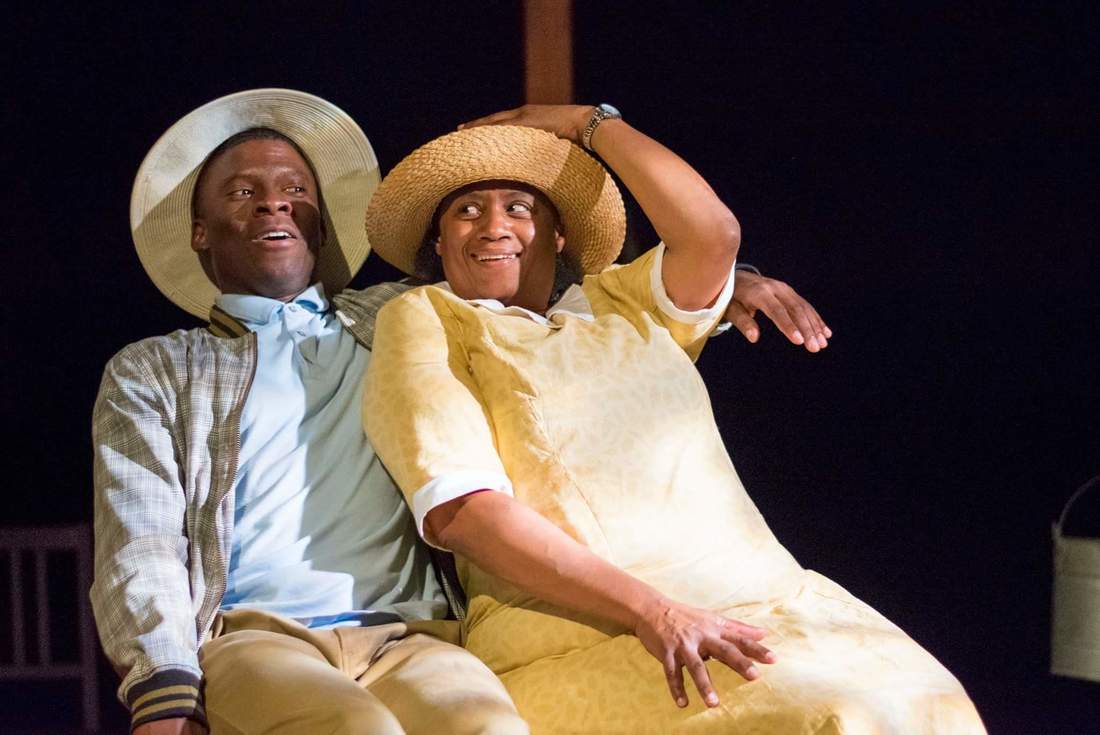|
Cortez L. Johnson and Portia Gregory in "The Ballad of Emmett Till." Photo courtesy of ion theatre From the moment he came into the world “feet first” as the result of a breech birth, Emmett Till wanted to stand up, his mother recalls early in Ifa Bayeza’s powerful play. How the African-American boy affectionately called “Bobo” left the world at only 14 years old shocked the nation in 1955 and set off reverberations in the civil rights movement. Yet the lynching of this boy who from the get-go wanted to be a man doesn’t tell the entire story of Bayeza’s “The Ballad of Emmett Till,” which is having its San Diego premiere at ion theatre in Hillcrest. The lyrical one-act play is also a celebration of Emmett’s lives: the one he lived all too briefly with such unabashed energy, and the one he might have lived, which endured in the memories of those who loved him.
Bayeza’s 2008 work chronicles the story of Chicago-born Emmett’s visit to his great-Uncle Mose’s Delta-town farm in Mississippi and ultimately an encounter in a grocery store that would precipitate the teenage boy’s kidnapping and murder, terrifyingly dramatized on the small ion theatre stage. This version of “The Ballad of Emmitt Till,” co-directed at ion by Yolanda Franklin and Claudio Raygoza, features a six-actor ensemble, Bayeza’s scaling down of her original 13-character piece. Five of them (Dwaine Collier, Rhys Greene, Portia Gregory, Tamara McMillian and Grandison Phelps III) play multiple roles, with Cortez L. Johnson, seen earlier this year in Moxie Theatre’s charged “Blue Door,” portraying Emmett. It’s a cohesive group occupying tense proceedings that are always in motion. Throughout the production they join in uplifting, spiritual song that in its passion testifies to the deep intertwining of those in Emmett’s life and their commitment to survival. Emmitt, a young man with a stutter and an endearing guilelessness, proudly arrives at his great-uncle’s farm wearing his Panama hat and white bucks. He is wholly unprepared for arduous chores like picking cotton and plucking chickens (both amusingly re-created). It’s his very innocence about the suffocating atmosphere of hate nearby (“Be respectful,” “Don’t speak to white folk,” he’s cautioned) that turn his adventure away from home to terror. The adult Johnson may not look like a 14-year-old, of course, but he effectively inhabits the naivete and unshakeable will of this one, who out loud can’t believe that God will let him die. The last half-hour of this 95-minute production is the most gut-wrenching for an audience. The abduction of Emmett, and even more so the dramatized trial in which the boy’s mother recounts trying to identify her son after his mutilated body was found in the river, are frank and graphic. (Emmett’s mother insisted on an open casket to ensure that the horror of her son’s murder of hate be understood.) But as Emmett’s presence stands tall over those left behind at play’s end, notes of hope resonate: for justice, for immortality, and, in Bayeza’s words, for “a new world.” (Review originally published in San Diego Union-Tribune on 7/10/17.)
0 Comments
Leave a Reply. |
AuthorDavid L. Coddon is a Southern California theater critic. Archives
July 2024
Categories |
David Coddon |
|
